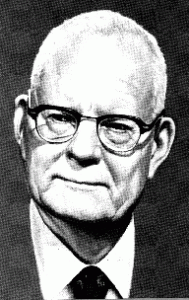
William Edwards Deming (October 14, 1900 – December 20, 1993) was an American statistician, professor, author, lecturer, and consultant. He is perhaps best known for his work in Japan. There, from 1950 onward, he taught top management how to improve design (and thus service), product quality, testing and sales (the last through global markets) through various methods, including the application of statistical methods.
Deming made a significant contribution to Japan’s later reputation for innovative high-quality products and its economic power. He is regarded as having had more impact upon Japanese manufacturing and business than any other individual not of Japanese heritage. Despite being considered something of a hero in Japan, he was only just beginning to win widespread recognition in the U.S. at the time of his death.
Deming developed the sampling techniques that were used for the first time during the 1940 U.S. Census. During World War II, Deming was a member of the five-man Emergency Technical Committee. He worked with H.F. Dodge, A.G. Ashcroft, Leslie E. Simon, R.E. Wareham, and John Gaillard in the compilation of the American War Standards (American Standards Association Z1.1-3 published in 1942) and taught statistical process control (SPC) techniques to workers engaged in wartime production. Statistical methods were widely applied during World War II, but faded into disuse a few years later in the face of huge overseas demand for American mass-produced products.
Source: http://en.wikipedia.org/wiki/W._Edwards_Deming
Time is a great lens that clarifies the past. Think about managers running companies at the end of WWII: euphoria runs rampant, America is validated as a superior fighting force and economy, and this national pride distills down to pride in their company.
Demand for American products is exploding around the world. You can sell anything you make. Given their understanding at that time, why would anyone risk limiting those sales by emphasizing quality efforts?
How quickly we find these companies on the ‘slippery slope’ toward mediocrity. Within a few years after WWII, all evidence of the statistical process control efforts had disappeared from companies that successfully employed them during the war. Once again, we find a gap between what a company knows and what it does.
Dr Deming identified The “Seven Deadly Diseases”, the first being lack of constancy of purpose. Many writers have expanded this concept elsewhere and I encourage you to gain a firm understanding. I wish to explore the relationship between the knowing-doing gap and companies that lack a constancy of purpose.
Those business leaders that saw great short term opportunity at the end of WWII lacked the constancy of purpose that could have led to great long term success. Some of those companies, the lucky ones that survived their indiscretion, returned to statistical process control decades later as competitors were taking away market share and profits. But alas, their lacking constancy of purpose led to predictable shifts in strategy with the next turn in the business cycle.
A manufacturing center manager employing in excess of 1000 people recently stated that running his business is ‘a grind’. His words shouldn’t be perceived in a negative light. He is conveying his attention to detail; It requires daily attention to systems, daily leadership of the troops executing the same, and a willingness to be the source of system discipline for the entire group.
When a failure occurs, his investigation centers on the system instead of the individual. His leadership team learns while observing his behavior and re-doubles its efforts to properly use systems. Eventually, every employee has a sense that these systems are really important and ‘how we do business here’. And we never purchased a single banner to extol the virtues of the system. People respond to leadership.
Once a system is being effectively operated the leader is free to devote his attention elsewhere – new systems, new challenges. But be wary of back sliding; remain vigilant to each system’s effectiveness.
Effective Leadership has constancy of purpose. Effective leadership closes the knowing-doing gap. Effective leadership drives business success.
The Phoenix Group and Its member companies Phoenix Systems, Phoenix Services, Phoenix TEQ Ashland, Phoenix TEQ Cincinnati, and Phoenix TEQ Rockport have been closing the knowing-doing gap for 20 years. Through consulting projects we teach manufacturers and professional organizations. Our contract labor resources execute today’s business strategies with the highest integrity, focused on customer success, and our business process outsourcing has provided us an opportunity to deliver on the principles we’ve taught others.
Jeffrey Pfeffer coined the phrase “knowing-doing gap”. His blog Rational Rants.
Kirk Wiley, Chief Operating Officer, The Phoenix Group Kirk at LinkedIn


